world
-
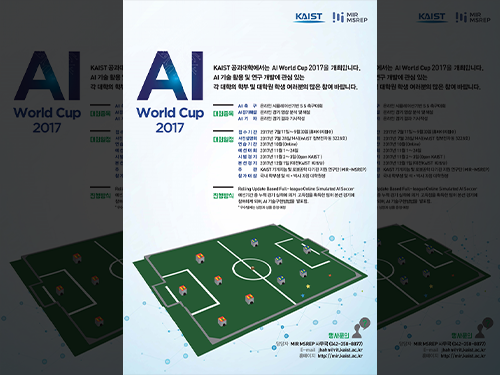 KAIST to Host the 2017 AI World Cup in November
KAIST, the birthplace of the Robot World Cup in 1996, now presents a new technology matchup, the AI World Cup this November, which will be held at KAIST. The event is being organized by the Machine Intelligence and Robotics Multi-Sponsored Research and Education Platform (MIR-MSREP) of KAIST. The online, simulated AI soccer game, based on rolling updates, will be a draw for avid online gamers and tech-savvy university students from around the nation.
The tournament is comprised of three events: ▲A 5 on 5 AI soccer match to be played after self-learning using AI technology in an online simulation environment ▲Commentary in which online soccer videos are analyzed and commented on, and ▲Game reporters who will write articles on online soccer event results.
The participants will undergo a month-long online practice period in October and compete in preliminary matches from November 1 through 24. The top teams that scored the highest accumulated points will compete in the finals on December 1. In the finals, each team’s AI technology implementation method will be evaluated to select the final winning team. To ensure a successful event, KAIST will host a briefing session for participants on July 28.
Technological prowess and early exposure to AI accumulated at KAIST led to the launching of this tournament. Professor Jong-Hwan Kim, the chair of the Organizing Committee of the AI World Cup, hosted the first ever Robot World Cup back in 1996. His concept has now evolved into the emerging technology of AI and the members of the Organizing Committee encompass the professors from the various departments of electrical engineering, computing, industrial and systems engineering, aerospace engineering, civil and environmental engineering, and the graduate schools of Green Transportation, Cultural Technology, and Science and Technology Policy.
In particular, ongoing convergence research initiatives incorporating AI into a wide arrays of disciplines such as bio, nano, and IT, played a crucial role for making this AI World Cup happen. Professor Kim said, “The winner of this year’s competition will be awarded a certificate and a small gift. In 2018, we aim to expand the event to an international scale by allowing international teams.”
Any undergraduate or graduate student in Korea can apply to participate in the ‘AI World Cup 2017’. KAIST will host a public trial event during the ‘Open KAIST’ event period to be held November 2-3 to help participating students understand the event better. ‘Open KAIST’ allows the general public to personally visit and experience what goes on in engineering departments and laboratories on the KAIST main campus. It is hosted by the College of Engineering every two years and is the largest event hosted by KAIST.
To participate in the ‘AI World Cup 2017,’ teams consisting of Korean undergraduates or graduate students can fill out application forms and submit them by September 30 on http://mir.kaist.ac.kr .
2017.07.14 View 12229
KAIST to Host the 2017 AI World Cup in November
KAIST, the birthplace of the Robot World Cup in 1996, now presents a new technology matchup, the AI World Cup this November, which will be held at KAIST. The event is being organized by the Machine Intelligence and Robotics Multi-Sponsored Research and Education Platform (MIR-MSREP) of KAIST. The online, simulated AI soccer game, based on rolling updates, will be a draw for avid online gamers and tech-savvy university students from around the nation.
The tournament is comprised of three events: ▲A 5 on 5 AI soccer match to be played after self-learning using AI technology in an online simulation environment ▲Commentary in which online soccer videos are analyzed and commented on, and ▲Game reporters who will write articles on online soccer event results.
The participants will undergo a month-long online practice period in October and compete in preliminary matches from November 1 through 24. The top teams that scored the highest accumulated points will compete in the finals on December 1. In the finals, each team’s AI technology implementation method will be evaluated to select the final winning team. To ensure a successful event, KAIST will host a briefing session for participants on July 28.
Technological prowess and early exposure to AI accumulated at KAIST led to the launching of this tournament. Professor Jong-Hwan Kim, the chair of the Organizing Committee of the AI World Cup, hosted the first ever Robot World Cup back in 1996. His concept has now evolved into the emerging technology of AI and the members of the Organizing Committee encompass the professors from the various departments of electrical engineering, computing, industrial and systems engineering, aerospace engineering, civil and environmental engineering, and the graduate schools of Green Transportation, Cultural Technology, and Science and Technology Policy.
In particular, ongoing convergence research initiatives incorporating AI into a wide arrays of disciplines such as bio, nano, and IT, played a crucial role for making this AI World Cup happen. Professor Kim said, “The winner of this year’s competition will be awarded a certificate and a small gift. In 2018, we aim to expand the event to an international scale by allowing international teams.”
Any undergraduate or graduate student in Korea can apply to participate in the ‘AI World Cup 2017’. KAIST will host a public trial event during the ‘Open KAIST’ event period to be held November 2-3 to help participating students understand the event better. ‘Open KAIST’ allows the general public to personally visit and experience what goes on in engineering departments and laboratories on the KAIST main campus. It is hosted by the College of Engineering every two years and is the largest event hosted by KAIST.
To participate in the ‘AI World Cup 2017,’ teams consisting of Korean undergraduates or graduate students can fill out application forms and submit them by September 30 on http://mir.kaist.ac.kr .
2017.07.14 View 12229 -
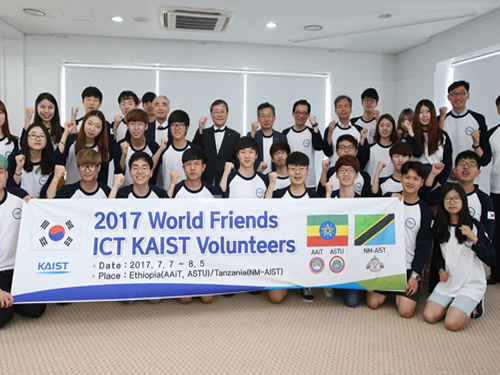 2017 World Friends ICT KAIST Sets Off to Ethiopia, Tanzania
KAIST launched the ‘2017 World Friends ICT KAIST’ on 21 June at a ceremony held at the Faculty Club. The event was attended by 40 student volunteers and faculty members including President Sung-Chul Shin and student volunteers.
The ‘2017 World Friends ICT KAIST’ is an oversees volunteer program aimed at providing ICT education for students from developing countries and for cultural exchange. The program was organized by the KAIST Leadership Center and sponsored by the National Information Agency (NIA) since 2015.
President Sung-Chul Shin delivered words of encouragement to start the opening ceremony, followed by an oath-taking by the volunteer group, safety training, and a commemorative photoshoot. This year’s World Friends ICT volunteer group consisted of 32 students and 2 staff members to lead and to support the team.
The group was divided into eight teams including APP-frica, KAI-Tigers, and WITH (4 members per team) to volunteer in Addis Ababa Institute of Technology (AAIT) and Adama Science and Technology University in Ethiopia (ASTU), as well as Nelson Mandela African Institute of Science and Technology (NM-AIST) in Tanzania. The teams will educate local students on ICT and promote cultural exchanges. The volunteer period is from July 7 to August 5, lasting about a month.
KAIST conducted primary document examinations and interviews from April 27 to May 18 on volunteer candidates who registered to take part, and selected 32 student volunteers. A total of 68 students registered to volunteer, resulting in a 1:2.1 competition rate.
The volunteering program was customized to the local needs of Ethiopia and Tanzania and thus consisted of ICT education, cultural exchanges, volunteering at farms on the weekends, and science experiments. The area with the most focus by the volunteer team is ICT education, which accounts for 70% of the total volunteer activities. The aim is to educate Ethiopian students at AAIT and ASTU on Windows, MS Office, Adobe Photoshop, and using smartphones. In Tanzania, the team is to volunteer with students of NM-AIST to provide ICT application education such as water tank control using appropriate technology and Arduino to local high school students.
The team is also planning to promote cultural exchanges by preparing K-Pop dancing, traditional Korean games such as Korean shuttlecock game (jegichagi) and Korean wrestling (ssireum), traditional cooking such as bibimbab and half-moon-shaped rice cake (songpyeon), and teaching the Korean language, as well as preparing cultural performances with local university students. On the weekends, the team will visit local farms to volunteer, and local elementary schools and orphanages to conduct science experiments for children, as well as physical education and art activities.
(Photo caption: Volunteers poses with faculty and staff members including President Sung-Chul Shin at a ceremony on June 21.)
2017.06.29 View 11801
2017 World Friends ICT KAIST Sets Off to Ethiopia, Tanzania
KAIST launched the ‘2017 World Friends ICT KAIST’ on 21 June at a ceremony held at the Faculty Club. The event was attended by 40 student volunteers and faculty members including President Sung-Chul Shin and student volunteers.
The ‘2017 World Friends ICT KAIST’ is an oversees volunteer program aimed at providing ICT education for students from developing countries and for cultural exchange. The program was organized by the KAIST Leadership Center and sponsored by the National Information Agency (NIA) since 2015.
President Sung-Chul Shin delivered words of encouragement to start the opening ceremony, followed by an oath-taking by the volunteer group, safety training, and a commemorative photoshoot. This year’s World Friends ICT volunteer group consisted of 32 students and 2 staff members to lead and to support the team.
The group was divided into eight teams including APP-frica, KAI-Tigers, and WITH (4 members per team) to volunteer in Addis Ababa Institute of Technology (AAIT) and Adama Science and Technology University in Ethiopia (ASTU), as well as Nelson Mandela African Institute of Science and Technology (NM-AIST) in Tanzania. The teams will educate local students on ICT and promote cultural exchanges. The volunteer period is from July 7 to August 5, lasting about a month.
KAIST conducted primary document examinations and interviews from April 27 to May 18 on volunteer candidates who registered to take part, and selected 32 student volunteers. A total of 68 students registered to volunteer, resulting in a 1:2.1 competition rate.
The volunteering program was customized to the local needs of Ethiopia and Tanzania and thus consisted of ICT education, cultural exchanges, volunteering at farms on the weekends, and science experiments. The area with the most focus by the volunteer team is ICT education, which accounts for 70% of the total volunteer activities. The aim is to educate Ethiopian students at AAIT and ASTU on Windows, MS Office, Adobe Photoshop, and using smartphones. In Tanzania, the team is to volunteer with students of NM-AIST to provide ICT application education such as water tank control using appropriate technology and Arduino to local high school students.
The team is also planning to promote cultural exchanges by preparing K-Pop dancing, traditional Korean games such as Korean shuttlecock game (jegichagi) and Korean wrestling (ssireum), traditional cooking such as bibimbab and half-moon-shaped rice cake (songpyeon), and teaching the Korean language, as well as preparing cultural performances with local university students. On the weekends, the team will visit local farms to volunteer, and local elementary schools and orphanages to conduct science experiments for children, as well as physical education and art activities.
(Photo caption: Volunteers poses with faculty and staff members including President Sung-Chul Shin at a ceremony on June 21.)
2017.06.29 View 11801 -
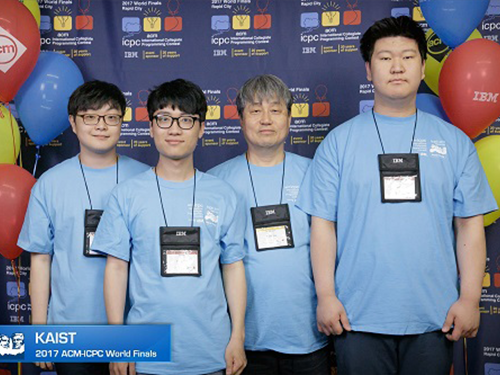 KAIST Team Wins Bronze Medal at Int'l Programming Contest
A KAIST Team consisting of undergraduate students from the School of Computing and Department of Mathematical Science received a bronze medal and First Problem Solver award at an international undergraduate programming competition, The Association for Computing Machinery-International Collegiate Programming Contest (ACM-ICPC) World Finals.
The 41st ACM-ICPC hosted by ACM and funded by IBM was held in South Dakota in the US on May 25. The competition, first held in 1977, is aimed at undergraduate students from around the world. A total of 50,000 students from 2900 universities and 103 countries participated in the regional competition and 400 students competed in the finals.
The competition required teams of three to solve 12 problems. The KAIST team was coached by Emeritus Professor Sung-Yong Shin and Professor Taisook Han. The student contestants were Jihoon Ko and Hanpil Kang from the School of Computing and Jongwoon Lee from the Department of Mathematical Science. The team finished ranked 9th, receiving a bronze medal and a $3000 prize. Additionally, the team was the first to solve all the problems and received the First Problem Solver award. Detailed score information can be found on. https://icpc.baylor.edu/scoreboard/
(Photo caption: Professor Taisook Han and his students)
2017.06.12 View 10544
KAIST Team Wins Bronze Medal at Int'l Programming Contest
A KAIST Team consisting of undergraduate students from the School of Computing and Department of Mathematical Science received a bronze medal and First Problem Solver award at an international undergraduate programming competition, The Association for Computing Machinery-International Collegiate Programming Contest (ACM-ICPC) World Finals.
The 41st ACM-ICPC hosted by ACM and funded by IBM was held in South Dakota in the US on May 25. The competition, first held in 1977, is aimed at undergraduate students from around the world. A total of 50,000 students from 2900 universities and 103 countries participated in the regional competition and 400 students competed in the finals.
The competition required teams of three to solve 12 problems. The KAIST team was coached by Emeritus Professor Sung-Yong Shin and Professor Taisook Han. The student contestants were Jihoon Ko and Hanpil Kang from the School of Computing and Jongwoon Lee from the Department of Mathematical Science. The team finished ranked 9th, receiving a bronze medal and a $3000 prize. Additionally, the team was the first to solve all the problems and received the First Problem Solver award. Detailed score information can be found on. https://icpc.baylor.edu/scoreboard/
(Photo caption: Professor Taisook Han and his students)
2017.06.12 View 10544 -
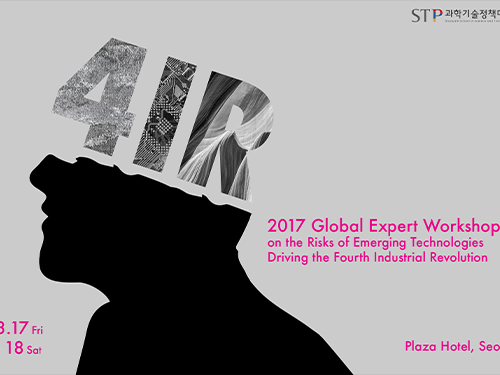 Global Workshop on the Risks of Emerging Technologies
The Center for Science, Policy and Society (CSPS) at the Graduate School of Science and Technology Policy of KAIST will host the 2017 Global Expert Workshop on the Risks of Emerging Technologies Driving the Fourth Industrial Revolution March 17-18 at the Plaza Hotel in Seoul.
At the workshop, experts from public and private sectors at home and abroad will address the socio-economic impacts and implications of the emergence of new technologies that the Fourth Industrial Revolution will bring about. The workshop will be hosted in collaboration with the World Economic Forum’s Global Future Council (GFC) on Technology, Values and Policy. The World Economic Forum’s network of GFCs is the world’s foremost interdisciplinary knowledge network dedicated to promoting innovative thinking about the future.
Four keynote speakers, including Professor Wendell Wallach of the Interdisciplinary Center for Bioethics at Yale University and Dean of the School of Public Policy and Management at Tsinghua University Lan Xue, will deliver speeches. Professor Wallach is the leader of an AI/Robotics Global Governance Project sponsored by the World Economic Forum and will make a speech entitled “Build the Global Infrastructure to Make Sure that AI and Robotics Will Be Beneficial.” Dean Xue, a member of the World Economic Forum’s GFC on Tech, Values, and Policy, is well known for his analysis of the social implications of the risks brought about by emerging technologies. He will speak on “Global Risk Governance of Disruptive 4IR Technologies.”
More than thirty experts will participate in the workshop. Speakers include the KAIST Vice President for Planning and Budget Soohyun Kim, Dean of KAIST Institute San Yup Lee, Professor Jaeseung Jeong of the Department of Bio and Brain Engineering at KAIST, Dr. Sung Chul Kang of the KIST Healthcare Robotics Research Group, and Korea Evaluation Institute of Industrial Technology Program Director Kyong Hoon Kim.
The CSPS of KAIST will continue to make collaborative research efforts with the GFC for developing new insights and perspectives on key global systems as well as study the impact and governance of key emerging technologies.
2017.03.16 View 10909
Global Workshop on the Risks of Emerging Technologies
The Center for Science, Policy and Society (CSPS) at the Graduate School of Science and Technology Policy of KAIST will host the 2017 Global Expert Workshop on the Risks of Emerging Technologies Driving the Fourth Industrial Revolution March 17-18 at the Plaza Hotel in Seoul.
At the workshop, experts from public and private sectors at home and abroad will address the socio-economic impacts and implications of the emergence of new technologies that the Fourth Industrial Revolution will bring about. The workshop will be hosted in collaboration with the World Economic Forum’s Global Future Council (GFC) on Technology, Values and Policy. The World Economic Forum’s network of GFCs is the world’s foremost interdisciplinary knowledge network dedicated to promoting innovative thinking about the future.
Four keynote speakers, including Professor Wendell Wallach of the Interdisciplinary Center for Bioethics at Yale University and Dean of the School of Public Policy and Management at Tsinghua University Lan Xue, will deliver speeches. Professor Wallach is the leader of an AI/Robotics Global Governance Project sponsored by the World Economic Forum and will make a speech entitled “Build the Global Infrastructure to Make Sure that AI and Robotics Will Be Beneficial.” Dean Xue, a member of the World Economic Forum’s GFC on Tech, Values, and Policy, is well known for his analysis of the social implications of the risks brought about by emerging technologies. He will speak on “Global Risk Governance of Disruptive 4IR Technologies.”
More than thirty experts will participate in the workshop. Speakers include the KAIST Vice President for Planning and Budget Soohyun Kim, Dean of KAIST Institute San Yup Lee, Professor Jaeseung Jeong of the Department of Bio and Brain Engineering at KAIST, Dr. Sung Chul Kang of the KIST Healthcare Robotics Research Group, and Korea Evaluation Institute of Industrial Technology Program Director Kyong Hoon Kim.
The CSPS of KAIST will continue to make collaborative research efforts with the GFC for developing new insights and perspectives on key global systems as well as study the impact and governance of key emerging technologies.
2017.03.16 View 10909 -
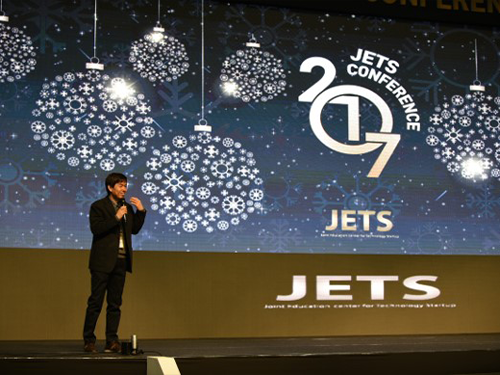 JETS Conference 2017
KAIST and four science and technology research universities in Korea co-hosted a technology start-up fair, the 2017 JETS (Job, Exhibition, Tech Forum, and Startup) Conference January 19 ~20 in the Ryu Geun-chul Sports Complex at KAIST.
Korea’s major science and technology research universities, Daegu Gyeongbuk Institute of Science and Technology (DGIST), Gwangju Institute of Science and Technology (GIST), Pohang University of Science and Technology (Postech), and Ulsan National Institute of Science and Technology (UNIST), held the event in a collaborative effort to educate, inspire, and connect young entrepreneurs, especially those who will launch technology start-ups.
The conference brought entrepreneurs and innovators together who seek ways of working with and supporting start-ups and for their sustainable growth. It also drew aspiring young students and researchers from universities and the government-funded research institutions who are in the process of commercializing their technology. Students from each university’s industry-academia cooperation program who incubated their technology and ideas were key contributors.
At the Tech Forum, entrepreneurship and technology consultation specialists including Joe Jasin, managing director at DNA Investment Partners in the US, the founder of Cyworld Dong-Hyung Lee, and Professor Hawoong Jeong, a complex bio-network specialist from the Department of Physics of KAIST lectured on the ecosystem of start-ups and its trends and development.
The Dean of University-Industry Cooperation at KAIST Joongmyeon Bae said, "We organized this event in collaboration with four major research universities to further encourage technology start-ups from young students and help their ideas and technology bear fruit. We will continue to strive to create an ecosystem of start-ups which works efficiently.”
(Above photo: Founder of the Cyworld, Dong-Hyung Lee gives a lecture at the Tech Forum. Below photo: Students visit exhibition booth of each participating institution.)
2017.01.20 View 12789
JETS Conference 2017
KAIST and four science and technology research universities in Korea co-hosted a technology start-up fair, the 2017 JETS (Job, Exhibition, Tech Forum, and Startup) Conference January 19 ~20 in the Ryu Geun-chul Sports Complex at KAIST.
Korea’s major science and technology research universities, Daegu Gyeongbuk Institute of Science and Technology (DGIST), Gwangju Institute of Science and Technology (GIST), Pohang University of Science and Technology (Postech), and Ulsan National Institute of Science and Technology (UNIST), held the event in a collaborative effort to educate, inspire, and connect young entrepreneurs, especially those who will launch technology start-ups.
The conference brought entrepreneurs and innovators together who seek ways of working with and supporting start-ups and for their sustainable growth. It also drew aspiring young students and researchers from universities and the government-funded research institutions who are in the process of commercializing their technology. Students from each university’s industry-academia cooperation program who incubated their technology and ideas were key contributors.
At the Tech Forum, entrepreneurship and technology consultation specialists including Joe Jasin, managing director at DNA Investment Partners in the US, the founder of Cyworld Dong-Hyung Lee, and Professor Hawoong Jeong, a complex bio-network specialist from the Department of Physics of KAIST lectured on the ecosystem of start-ups and its trends and development.
The Dean of University-Industry Cooperation at KAIST Joongmyeon Bae said, "We organized this event in collaboration with four major research universities to further encourage technology start-ups from young students and help their ideas and technology bear fruit. We will continue to strive to create an ecosystem of start-ups which works efficiently.”
(Above photo: Founder of the Cyworld, Dong-Hyung Lee gives a lecture at the Tech Forum. Below photo: Students visit exhibition booth of each participating institution.)
2017.01.20 View 12789 -
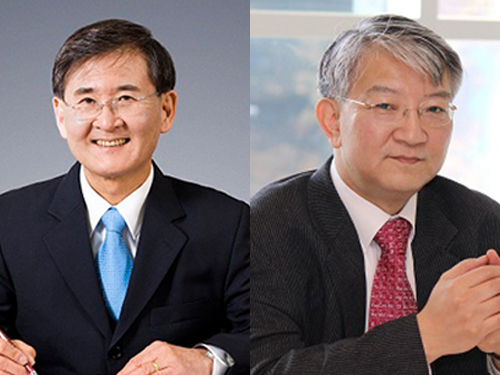 KAIST to Participate in the 2017 Davos Forum
(President Sung-Mo Kang and Distinguished Professor Sang Yup Lee)
KAIST representatives will join high profile, multi-stakeholder dialogues with global leaders across the world to discuss higher education, science, and technological innovation.
KAIST President Sung-Mo Kang and Distinguished Professor Sang Yup Lee of the Chemical and Biomolecular Engineering Department will participate in the World Economic Forum’s (WEF) Annual Meeting on January 17-20, 2017, in Davos-Klosters, Switzerland.
To be held under the theme “Responsive and Responsible Leadership,” the Annual Meeting will offer global leaders from government, business, academia, and civil society a highly interactive platform to address some of the most pressing issues facing the world today, from climate change, economic inequality, to the Fourth Industrial Revolution and its impact on future employment.
On January 18, President Kang will participate in the Global University Leaders Forum, a community of top 26 universities invited from around the world, and will discuss the relevance of higher education in the context of the Fourth Industrial Revolution. He will also share KAIST’s experiences in developing innovative initiatives to bring future-oriented and creative values into its educational and research programs.
On January 19, at the Global Future Council on Production, President Kang will speak about new technologies taking place in traditional production and distribution systems as introduced by the emergence of rapidly evolving technological advancements, and present KAIST’s endeavors to transform those changes into opportunities.
With an eminent group of scientists, including the Director of the US National Science Foundation France A. Córdova and the Editor-in-Chief Philip Campbell of Nature at the Global Science Outlook session, on January 20, President Kang will discuss key challenges for the global science agenda in the year ahead and examine the role of science in formulating public discussions and polices that will have great impact on society and the lives of people.
Currently, Professor Lee is the founding Co-Chair of the WEF’s Global Future Council, an interdisciplinary knowledge network dedicated to promoting innovative thinking on the future. On January 20, he will share his insights at an independent session entitled “World Changing Technology: Biotech and Neurotech,” briefing the audience on the current state of research, development, and commercialization in these fields, as well as explaining how they will contribute to coping with the Fourth Industrial Revolution.
Professor Lee said, “In recent years, we have seen the world become ever more complex, interconnected, and realigned as it is deeply affected by this unprecedented technological innovations, collectively driving the Fourth Industrial Revolution. One pillar of such innovation will take place in biotechnology and neuroscience, which will help us design solutions to many of global problems such as environment, pandemic diseases, aging, healthcare, and previously intractable illnesses.”
President Kang added, “This year’s Davos meeting will focus on the need to foster leadership at the national, regional, and global level to respond collectively with credible actions to issues of major concern for the sustainable and equitable growth, social inclusion, and human development. KAIST has always been a crucial player in these collaborative efforts, and I am happy to share our insights at the upcoming event.”
2017.01.17 View 9622
KAIST to Participate in the 2017 Davos Forum
(President Sung-Mo Kang and Distinguished Professor Sang Yup Lee)
KAIST representatives will join high profile, multi-stakeholder dialogues with global leaders across the world to discuss higher education, science, and technological innovation.
KAIST President Sung-Mo Kang and Distinguished Professor Sang Yup Lee of the Chemical and Biomolecular Engineering Department will participate in the World Economic Forum’s (WEF) Annual Meeting on January 17-20, 2017, in Davos-Klosters, Switzerland.
To be held under the theme “Responsive and Responsible Leadership,” the Annual Meeting will offer global leaders from government, business, academia, and civil society a highly interactive platform to address some of the most pressing issues facing the world today, from climate change, economic inequality, to the Fourth Industrial Revolution and its impact on future employment.
On January 18, President Kang will participate in the Global University Leaders Forum, a community of top 26 universities invited from around the world, and will discuss the relevance of higher education in the context of the Fourth Industrial Revolution. He will also share KAIST’s experiences in developing innovative initiatives to bring future-oriented and creative values into its educational and research programs.
On January 19, at the Global Future Council on Production, President Kang will speak about new technologies taking place in traditional production and distribution systems as introduced by the emergence of rapidly evolving technological advancements, and present KAIST’s endeavors to transform those changes into opportunities.
With an eminent group of scientists, including the Director of the US National Science Foundation France A. Córdova and the Editor-in-Chief Philip Campbell of Nature at the Global Science Outlook session, on January 20, President Kang will discuss key challenges for the global science agenda in the year ahead and examine the role of science in formulating public discussions and polices that will have great impact on society and the lives of people.
Currently, Professor Lee is the founding Co-Chair of the WEF’s Global Future Council, an interdisciplinary knowledge network dedicated to promoting innovative thinking on the future. On January 20, he will share his insights at an independent session entitled “World Changing Technology: Biotech and Neurotech,” briefing the audience on the current state of research, development, and commercialization in these fields, as well as explaining how they will contribute to coping with the Fourth Industrial Revolution.
Professor Lee said, “In recent years, we have seen the world become ever more complex, interconnected, and realigned as it is deeply affected by this unprecedented technological innovations, collectively driving the Fourth Industrial Revolution. One pillar of such innovation will take place in biotechnology and neuroscience, which will help us design solutions to many of global problems such as environment, pandemic diseases, aging, healthcare, and previously intractable illnesses.”
President Kang added, “This year’s Davos meeting will focus on the need to foster leadership at the national, regional, and global level to respond collectively with credible actions to issues of major concern for the sustainable and equitable growth, social inclusion, and human development. KAIST has always been a crucial player in these collaborative efforts, and I am happy to share our insights at the upcoming event.”
2017.01.17 View 9622 -
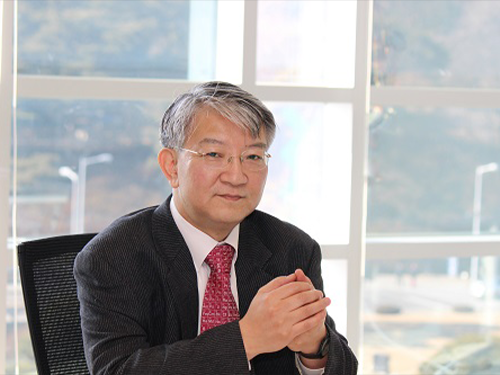 Professor Lee Co-chairs the Global Future Councils on Biotechnology of the WEF
The World Economic Forum (WEF) established a new global network of the world’s leading experts, “The Annual Meeting of the Global Future Councils,” to explore innovative solutions for the most pressing global challenges. The Councils’ first meeting took place on November 13-14, 2016, in Dubai, the United Arab Emirates (UAE). Some 25 nations joined as member states. The Councils have 35 committees.
Over 700 global leaders in business, government, civil society and academia gathered at the inaugural meeting to “develop ideas and strategies to prepare the world for the Fourth Industrial Revolution, with topics including smart cities, robotics, and the future of mobility,” according to a statement issued by the WEF.
Distinguished Professor Sang Yup Lee of Chemical and Biomolecular Engineering at KAIST was appointed to co-chair one of the Councils' committees, The Annual Meeting of the Global Future Councils on Biotechnology, for two years. The other chairperson is Dr. Feng Zhang, a professor of Biomedical Engineering at the Massachusetts Institute of Technology (MIT), who played a critical role in the development of optogenetics and CRISPR technologies.
The Biotechnology Committee consists of 24 globally recognized professionals in life sciences, law, ethics and policy including Thomas Connelly, the executive director of the American Chemical Society, Tina Fano, the executive vice president of Novozymes, and Mostafa Ronaghi, the chief technology officer of Illumina.
Professor Lee also serves as a committee member of The Annual Meeting of the Global Future Councils on the Fourth Industrial Revolution.
“Life sciences and engineering will receive more attention as a key element of the Fourth Industrial Revolution that the global society as a whole has been experiencing now. Together with thought leaders gathered worldwide, I will join the international community’s concerted efforts to address issues of importance that impact greatly on the future of humanity,” Professor Lee said.
In addition, Professor Lee received the James E. Bailey Award 2016 from The Society for Biological Engineering on November 15, 2016. He is the first Asian researcher to be recognized for his contributions to the field of biotechnology.
2016.11.15 View 9930
Professor Lee Co-chairs the Global Future Councils on Biotechnology of the WEF
The World Economic Forum (WEF) established a new global network of the world’s leading experts, “The Annual Meeting of the Global Future Councils,” to explore innovative solutions for the most pressing global challenges. The Councils’ first meeting took place on November 13-14, 2016, in Dubai, the United Arab Emirates (UAE). Some 25 nations joined as member states. The Councils have 35 committees.
Over 700 global leaders in business, government, civil society and academia gathered at the inaugural meeting to “develop ideas and strategies to prepare the world for the Fourth Industrial Revolution, with topics including smart cities, robotics, and the future of mobility,” according to a statement issued by the WEF.
Distinguished Professor Sang Yup Lee of Chemical and Biomolecular Engineering at KAIST was appointed to co-chair one of the Councils' committees, The Annual Meeting of the Global Future Councils on Biotechnology, for two years. The other chairperson is Dr. Feng Zhang, a professor of Biomedical Engineering at the Massachusetts Institute of Technology (MIT), who played a critical role in the development of optogenetics and CRISPR technologies.
The Biotechnology Committee consists of 24 globally recognized professionals in life sciences, law, ethics and policy including Thomas Connelly, the executive director of the American Chemical Society, Tina Fano, the executive vice president of Novozymes, and Mostafa Ronaghi, the chief technology officer of Illumina.
Professor Lee also serves as a committee member of The Annual Meeting of the Global Future Councils on the Fourth Industrial Revolution.
“Life sciences and engineering will receive more attention as a key element of the Fourth Industrial Revolution that the global society as a whole has been experiencing now. Together with thought leaders gathered worldwide, I will join the international community’s concerted efforts to address issues of importance that impact greatly on the future of humanity,” Professor Lee said.
In addition, Professor Lee received the James E. Bailey Award 2016 from The Society for Biological Engineering on November 15, 2016. He is the first Asian researcher to be recognized for his contributions to the field of biotechnology.
2016.11.15 View 9930 -
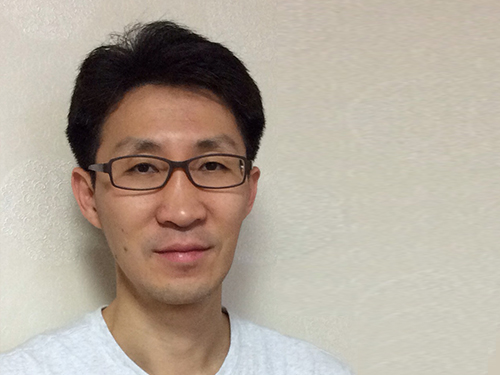 Professor Shin's Team Receives the Best Software Defined Network Solution Showcase Award
Professor Seungwon Shin of the Electrical Engineering School at KAIST and his research team won the Best Software Defined Networking (SDN) Solution Showcase Award hosted by the SDN World Congress, one of the biggest network summits held in Europe with over 2,000 participants. This year the conference took place in The Hague, the Netherlands, October 10-14, 2016.
SDN is an approach to computer networking that allows network administrators to respond quickly to changing business requirements via a centralized control console and to support the dynamic, scalable computing and storage needs of more modern computing environments such as data centers.
Collaborating with researchers from Queen’s University in the United Kingdom and Huawei, a global information and communications technology solutions provider in China, Professor Shin’s team, which is led by doctoral students Seungsoo Lee, Changhoon Yoon, and Jaehyun Nam, implemented a SDN security project called “DELTA.” ATTORESEARCH, a Korean SDN architecture and applications provider, conducted testing and verification for the project.
DELTA is a new SDN security evaluation framework with two main functions. It can automatically recognize attack cases against SDN elements across diverse environments and can assist in identifying unknown security problems within a SDN deployment.
The DELTA project consists of a control plane, the part of a network that carries signaling traffic and is responsible for routing; a data plane, the part of a network that carries user traffic; and a control channel that connects the two aforementioned planes. These three components have their own agents installed, which are all controlled by an agent manger. The agent manger can automatically detect any spots where the network security is weak.
Specifically, the project aimes to defense attacks against OpenFlow protocol, one of the first SDN standards; SDN controllers, a network operating system that is based on protocols; and network switch devices that use OpenFlow protocol.
The DELTA project was registered with the Open Networking Foundation, a user-driven organization dedicated to the promotion and adoption of SDN through open standards development, as an open source SDN security evaluation tool. This project is the only open source SDN which has been led by Korean researchers.
The SDN World Congress 2016 recognized the need for and importance of the DELTA project by conferring upon it the Best Solution Showcase Award. The Open Networking Foundation also widely publicized this award news.
Professor Shin said:
“In recent years, SDN has been attracting a large amount of interest as an emerging technology, but there still have not many SDN projects in Korea. This award acknowledges the advancement of Korean SDN technology, showing the potential for Korea to become a leader in SDN research.”
Picture: Major Components of the DELTA Project: Agents and Agent Manger
2016.10.25 View 9272
Professor Shin's Team Receives the Best Software Defined Network Solution Showcase Award
Professor Seungwon Shin of the Electrical Engineering School at KAIST and his research team won the Best Software Defined Networking (SDN) Solution Showcase Award hosted by the SDN World Congress, one of the biggest network summits held in Europe with over 2,000 participants. This year the conference took place in The Hague, the Netherlands, October 10-14, 2016.
SDN is an approach to computer networking that allows network administrators to respond quickly to changing business requirements via a centralized control console and to support the dynamic, scalable computing and storage needs of more modern computing environments such as data centers.
Collaborating with researchers from Queen’s University in the United Kingdom and Huawei, a global information and communications technology solutions provider in China, Professor Shin’s team, which is led by doctoral students Seungsoo Lee, Changhoon Yoon, and Jaehyun Nam, implemented a SDN security project called “DELTA.” ATTORESEARCH, a Korean SDN architecture and applications provider, conducted testing and verification for the project.
DELTA is a new SDN security evaluation framework with two main functions. It can automatically recognize attack cases against SDN elements across diverse environments and can assist in identifying unknown security problems within a SDN deployment.
The DELTA project consists of a control plane, the part of a network that carries signaling traffic and is responsible for routing; a data plane, the part of a network that carries user traffic; and a control channel that connects the two aforementioned planes. These three components have their own agents installed, which are all controlled by an agent manger. The agent manger can automatically detect any spots where the network security is weak.
Specifically, the project aimes to defense attacks against OpenFlow protocol, one of the first SDN standards; SDN controllers, a network operating system that is based on protocols; and network switch devices that use OpenFlow protocol.
The DELTA project was registered with the Open Networking Foundation, a user-driven organization dedicated to the promotion and adoption of SDN through open standards development, as an open source SDN security evaluation tool. This project is the only open source SDN which has been led by Korean researchers.
The SDN World Congress 2016 recognized the need for and importance of the DELTA project by conferring upon it the Best Solution Showcase Award. The Open Networking Foundation also widely publicized this award news.
Professor Shin said:
“In recent years, SDN has been attracting a large amount of interest as an emerging technology, but there still have not many SDN projects in Korea. This award acknowledges the advancement of Korean SDN technology, showing the potential for Korea to become a leader in SDN research.”
Picture: Major Components of the DELTA Project: Agents and Agent Manger
2016.10.25 View 9272 -
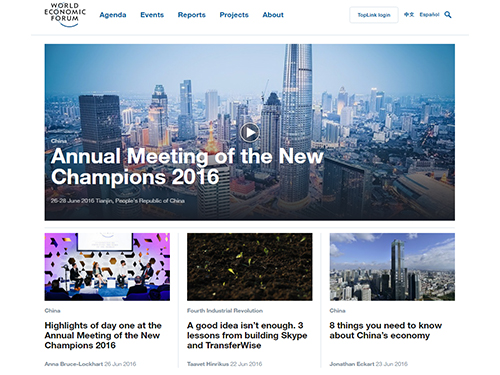 KAIST to Participate in Summer Davos Forum 2016 in China
A group of KAIST researchers will share their insights on the future and challenges of the current technological innovations impacting all aspects of society, while showcasing their research excellence in artificial intelligence and robotics.
Scientific and technological breakthroughs are more important than ever as key agents to drive social, economic, and political changes and advancements in today’s world. The World Economic Forum (WEF), an international organization that provides one of the broadest engagement platforms to address issues of major concern to the global community, will discuss the effects of these breakthroughs at its 10th Annual Meeting of the New Champions, a.k.a., the Summer Davos Forum, in Tianjin, China, June 26-28, 2016.
Three professors from the Korea Advanced Institute of Science and Technology (KAIST) will join the Annual Meeting and offer their expertise in the fields of biotechnology, artificial intelligence, and robotics to explore the conference theme, “The Fourth Industrial Revolution and Its Transformational Impact.” The Fourth Industrial Revolution, a term coined by WEF founder, Klaus Schwab, is characterized by a range of new technologies that fuse the physical, digital, and biological worlds, such as the Internet of Things, cloud computing, and automation.
Distinguished Professor Sang Yup Lee of the Chemical and Biomolecular Engineering Department will speak at the Experts Reception to be held on June 25, 2016 on the topic of “The Summer Davos Forum and Science and Technology in Asia.” On June 27, 2016, he will participate in two separate discussion sessions.
In the first session entitled “What If Drugs Are Printed from the Internet?,” Professor Lee will discuss the impacts of advancements in biotechnology and 3D printing technology on the future of medicine with Nita A. Farahany, a Duke University professor. Clare Matterson, the Director of Strategy at Wellcome Trust in the United Kingdom, will serve as the moderator. The discussants will note recent developments made in the way patients receive their medicine, for example, downloading drugs directly from the internet and the production of yeast strains to make opioids for pain treatment through systems metabolic engineering. They will also suggest how these emerging technologies will transform the landscape of the pharmaceutical industry in the years to come.
In the second session, “Lessons for Life,” Professor Lee will talk about how to nurture life-long learning and creativity to support personal and professional growth necessary in an era of the new industrial revolution.
During the Annual Meeting, Professors Jong-Hwan Kim of the Electrical Engineering School and David Hyunchul Shim of the Aerospace Department will host, together with researchers from Carnegie Mellon University and AnthroTronix, an engineering research and development company, a technological exhibition on robotics. Professor Kim, the founder of the internally renowned Robot World Cup, will showcase his humanoid soccer-playing micro-robots and display their various cutting-edge technologies such as imaging processing, artificial intelligence, walking, and balancing. Professor Shim will present a human-like robotic piloting system, PIBOT, which autonomously operates a simulated flight program by employing control sticks and guiding an airplane from takeoff to landing.
In addition, the two professors will join Professor Lee, who is also a moderator, to host a KAIST-led session on June 26, 2016, entitled “Science in Depth: From Deep Learning to Autonomous Machines.” Professors Kim and Shim will explore new opportunities and challenges in their fields from machine learning to autonomous robotics, including unmanned vehicles and drones.
Since 2011, KAIST has participated in the World Economic Forum’s two flagship conferences, the January and June Davos Forums, to introduce outstanding talents, share their latest research achievements, and interact with global leaders.
KAIST President Steve Kang said, “It is important for KAIST to be involved in global forums that identify issues critical to humanity and seek answers to solve them, and where our skills and knowledge in science and technology can play a meaningful role. The Annual Meeting in China will become another venue to accomplish this.”
2016.06.27 View 13198
KAIST to Participate in Summer Davos Forum 2016 in China
A group of KAIST researchers will share their insights on the future and challenges of the current technological innovations impacting all aspects of society, while showcasing their research excellence in artificial intelligence and robotics.
Scientific and technological breakthroughs are more important than ever as key agents to drive social, economic, and political changes and advancements in today’s world. The World Economic Forum (WEF), an international organization that provides one of the broadest engagement platforms to address issues of major concern to the global community, will discuss the effects of these breakthroughs at its 10th Annual Meeting of the New Champions, a.k.a., the Summer Davos Forum, in Tianjin, China, June 26-28, 2016.
Three professors from the Korea Advanced Institute of Science and Technology (KAIST) will join the Annual Meeting and offer their expertise in the fields of biotechnology, artificial intelligence, and robotics to explore the conference theme, “The Fourth Industrial Revolution and Its Transformational Impact.” The Fourth Industrial Revolution, a term coined by WEF founder, Klaus Schwab, is characterized by a range of new technologies that fuse the physical, digital, and biological worlds, such as the Internet of Things, cloud computing, and automation.
Distinguished Professor Sang Yup Lee of the Chemical and Biomolecular Engineering Department will speak at the Experts Reception to be held on June 25, 2016 on the topic of “The Summer Davos Forum and Science and Technology in Asia.” On June 27, 2016, he will participate in two separate discussion sessions.
In the first session entitled “What If Drugs Are Printed from the Internet?,” Professor Lee will discuss the impacts of advancements in biotechnology and 3D printing technology on the future of medicine with Nita A. Farahany, a Duke University professor. Clare Matterson, the Director of Strategy at Wellcome Trust in the United Kingdom, will serve as the moderator. The discussants will note recent developments made in the way patients receive their medicine, for example, downloading drugs directly from the internet and the production of yeast strains to make opioids for pain treatment through systems metabolic engineering. They will also suggest how these emerging technologies will transform the landscape of the pharmaceutical industry in the years to come.
In the second session, “Lessons for Life,” Professor Lee will talk about how to nurture life-long learning and creativity to support personal and professional growth necessary in an era of the new industrial revolution.
During the Annual Meeting, Professors Jong-Hwan Kim of the Electrical Engineering School and David Hyunchul Shim of the Aerospace Department will host, together with researchers from Carnegie Mellon University and AnthroTronix, an engineering research and development company, a technological exhibition on robotics. Professor Kim, the founder of the internally renowned Robot World Cup, will showcase his humanoid soccer-playing micro-robots and display their various cutting-edge technologies such as imaging processing, artificial intelligence, walking, and balancing. Professor Shim will present a human-like robotic piloting system, PIBOT, which autonomously operates a simulated flight program by employing control sticks and guiding an airplane from takeoff to landing.
In addition, the two professors will join Professor Lee, who is also a moderator, to host a KAIST-led session on June 26, 2016, entitled “Science in Depth: From Deep Learning to Autonomous Machines.” Professors Kim and Shim will explore new opportunities and challenges in their fields from machine learning to autonomous robotics, including unmanned vehicles and drones.
Since 2011, KAIST has participated in the World Economic Forum’s two flagship conferences, the January and June Davos Forums, to introduce outstanding talents, share their latest research achievements, and interact with global leaders.
KAIST President Steve Kang said, “It is important for KAIST to be involved in global forums that identify issues critical to humanity and seek answers to solve them, and where our skills and knowledge in science and technology can play a meaningful role. The Annual Meeting in China will become another venue to accomplish this.”
2016.06.27 View 13198 -
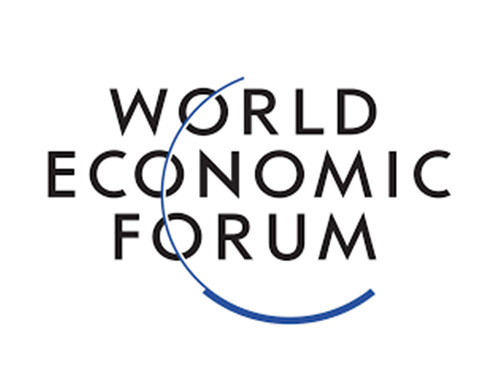 HUBO to Present at the 2016 World Economic Forum
KAIST researchers will lead an IdeasLab on biotechnology for an aging society while HUBO, the winner of the 2015 DARPA Robotics Challenge, will interact with the forum participants, offering an experience of state-of-the-art robotics technology.
Representatives from KAIST will attend the 2016 Annual Meeting of the World Economic Forum to run an IdeasLab and showcase its humanoid robot.
With over 2,500 leaders from business, government, international organizations, civil society, academia, media, and the arts expected to participate, the 2016 Annual Meeting will take place on January 20-23, 2016 in Davos-Klosters, Switzerland. Under the theme of “Mastering the Fourth Industrial Revolution,” global leaders will discuss the period of digital transformation that will have profound effects on economies, societies, and human behavior.
President Sung-Mo Kang will join the Global University Leaders Forum (GULF), a high-level academic meeting to foster collaboration among experts on issues of global concern for the future of higher education and the role of science in society. He will discuss how the emerging revolution in technology will affect the way universities operate and serve society. KAIST is the only Korean university participating in GULF, which is composed of prestigious universities invited from around the world.
Four KAIST professors, including Distinguished Professor Sang Yup Lee of the Chemical and Biomolecular Engineering Department, will lead an IdeasLab on “Biotechnology for an Aging Society.”
Professor Lee said, “In recent decades, much attention has been paid to the potential effect of the growth of an aging population and problems posed by it. At our IdeasLab, we will introduce some of our research breakthroughs in biotechnology to address the challenges of an aging society.”
In particular, he will present his latest research in systems biotechnology and metabolic engineering. His research has explained the mechanisms of how traditional Oriental medicine works in our bodies by identifying structural similarities between effective compounds in traditional medicine and human metabolites, and has proposed more effective treatments by employing such compounds.
KAIST will also display its networked mobile medical service system, “Dr. M.” Built upon a ubiquitous and mobile Internet, such as the Internet of Things, wearable electronics, and smart homes and vehicles, Dr. M will provide patients with a more affordable and accessible healthcare service.
In addition, Professor Jun-Ho Oh of the Mechanical Engineering Department will showcase his humanoid robot, “HUBO,” during the Annual Meeting. His research team won the International Humanoid Robotics Challenge hosted by the United States Defense Advanced Research Projects Agency (DARPA), which was held in Pomona, California, on June 5-6, 2015. With 24 international teams participating in the finals, HUBO completed all eight tasks in 44 minutes and 28 seconds, 6 minutes earlier than the runner-up, and almost 11 minutes earlier than the third-place team. Team KAIST walked away with the grand prize of USD 2 million.
Professor Oh said, “Robotics technology will grow exponentially in this century, becoming a real driving force to expedite the Fourth Industrial Revolution. I hope HUBO will offer an opportunity to learn about the current advances in robotics technology.”
President Kang pointed out, “KAIST has participated in the Annual Meeting of the World Economic Forum since 2011 and has engaged with a broad spectrum of global leaders through numerous presentations and demonstrations of our excellence in education and research. Next year, we will choreograph our first robotics exhibition on HUBO and present high-tech research results in biotechnology, which, I believe, epitomizes how science and technology breakthroughs in the Fourth Industrial Revolution will shape our future in an unprecedented way.”
2015.11.18 View 13198
HUBO to Present at the 2016 World Economic Forum
KAIST researchers will lead an IdeasLab on biotechnology for an aging society while HUBO, the winner of the 2015 DARPA Robotics Challenge, will interact with the forum participants, offering an experience of state-of-the-art robotics technology.
Representatives from KAIST will attend the 2016 Annual Meeting of the World Economic Forum to run an IdeasLab and showcase its humanoid robot.
With over 2,500 leaders from business, government, international organizations, civil society, academia, media, and the arts expected to participate, the 2016 Annual Meeting will take place on January 20-23, 2016 in Davos-Klosters, Switzerland. Under the theme of “Mastering the Fourth Industrial Revolution,” global leaders will discuss the period of digital transformation that will have profound effects on economies, societies, and human behavior.
President Sung-Mo Kang will join the Global University Leaders Forum (GULF), a high-level academic meeting to foster collaboration among experts on issues of global concern for the future of higher education and the role of science in society. He will discuss how the emerging revolution in technology will affect the way universities operate and serve society. KAIST is the only Korean university participating in GULF, which is composed of prestigious universities invited from around the world.
Four KAIST professors, including Distinguished Professor Sang Yup Lee of the Chemical and Biomolecular Engineering Department, will lead an IdeasLab on “Biotechnology for an Aging Society.”
Professor Lee said, “In recent decades, much attention has been paid to the potential effect of the growth of an aging population and problems posed by it. At our IdeasLab, we will introduce some of our research breakthroughs in biotechnology to address the challenges of an aging society.”
In particular, he will present his latest research in systems biotechnology and metabolic engineering. His research has explained the mechanisms of how traditional Oriental medicine works in our bodies by identifying structural similarities between effective compounds in traditional medicine and human metabolites, and has proposed more effective treatments by employing such compounds.
KAIST will also display its networked mobile medical service system, “Dr. M.” Built upon a ubiquitous and mobile Internet, such as the Internet of Things, wearable electronics, and smart homes and vehicles, Dr. M will provide patients with a more affordable and accessible healthcare service.
In addition, Professor Jun-Ho Oh of the Mechanical Engineering Department will showcase his humanoid robot, “HUBO,” during the Annual Meeting. His research team won the International Humanoid Robotics Challenge hosted by the United States Defense Advanced Research Projects Agency (DARPA), which was held in Pomona, California, on June 5-6, 2015. With 24 international teams participating in the finals, HUBO completed all eight tasks in 44 minutes and 28 seconds, 6 minutes earlier than the runner-up, and almost 11 minutes earlier than the third-place team. Team KAIST walked away with the grand prize of USD 2 million.
Professor Oh said, “Robotics technology will grow exponentially in this century, becoming a real driving force to expedite the Fourth Industrial Revolution. I hope HUBO will offer an opportunity to learn about the current advances in robotics technology.”
President Kang pointed out, “KAIST has participated in the Annual Meeting of the World Economic Forum since 2011 and has engaged with a broad spectrum of global leaders through numerous presentations and demonstrations of our excellence in education and research. Next year, we will choreograph our first robotics exhibition on HUBO and present high-tech research results in biotechnology, which, I believe, epitomizes how science and technology breakthroughs in the Fourth Industrial Revolution will shape our future in an unprecedented way.”
2015.11.18 View 13198 -
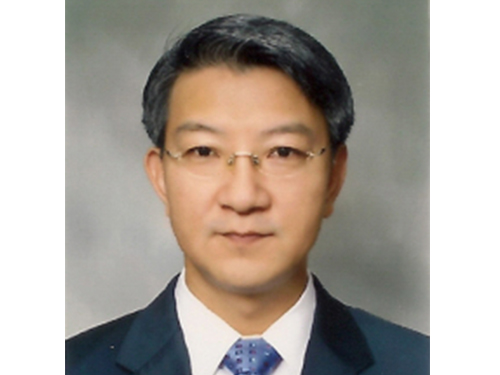 Distinguished Professor Sang Yup Lee Attends World Economic Forum's Workshop
Sang Yup Lee, Distinguished Professor of Chemical and Biomolecular Engineering at KAIST was invited to attend the Technology Pioneer and Global Growth Company CEO Workshop hosted by the World Economic Forum (WEF) on June 19-20, 2014 in San Francisco. During the workshop, Professor Lee joined a discussion on “disruptive technologies” as a panelist.
Currently serving for the evaluation committee that selects technology pioneers for the workshop, during the discussion, Professor Lee identified important issues facing humanity, analyzed the issues through forecasting, and presented converging disruptive technologies that provide solutions to the problems. He also shared the “ten emerging technologies” announced by the Global Agenda Council on Emerging Technologies, WEF and the Korean government’s technology innovation strategies adopted to achieve its economic development policy called creative economy.
2014.06.22 View 9298
Distinguished Professor Sang Yup Lee Attends World Economic Forum's Workshop
Sang Yup Lee, Distinguished Professor of Chemical and Biomolecular Engineering at KAIST was invited to attend the Technology Pioneer and Global Growth Company CEO Workshop hosted by the World Economic Forum (WEF) on June 19-20, 2014 in San Francisco. During the workshop, Professor Lee joined a discussion on “disruptive technologies” as a panelist.
Currently serving for the evaluation committee that selects technology pioneers for the workshop, during the discussion, Professor Lee identified important issues facing humanity, analyzed the issues through forecasting, and presented converging disruptive technologies that provide solutions to the problems. He also shared the “ten emerging technologies” announced by the Global Agenda Council on Emerging Technologies, WEF and the Korean government’s technology innovation strategies adopted to achieve its economic development policy called creative economy.
2014.06.22 View 9298 -
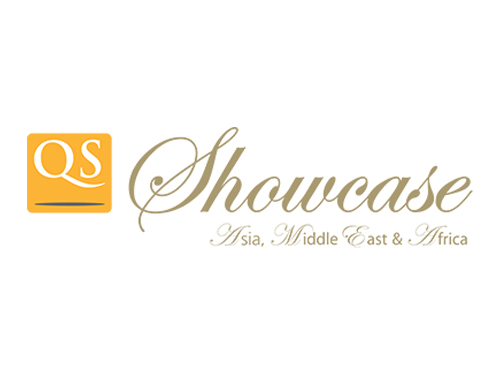 KAIST Featured in the 2014 QS Showcase-AMEA (Asia, Middle East, and Africa)
The QS World University Rankings has released the fourth Edition of QS Showcase-AMEA (Asia, Middle East, and Africa) in January 2014, both in print and online, which is an annual magazine presenting the progress of the top universities in these regions, as well as highlighting their breakthroughs and improvements.
The 2014 QS Showcase-AMEA included an interview with President Steve Kang, covering KAIST and its role in Korea, student mobility, as well as Korean higher education.
For the interview, please go to: http://qsshowcase.com/main/korea-casts-its-net-more-widely-to-stay-on-top/ .
2014.06.07 View 7613
KAIST Featured in the 2014 QS Showcase-AMEA (Asia, Middle East, and Africa)
The QS World University Rankings has released the fourth Edition of QS Showcase-AMEA (Asia, Middle East, and Africa) in January 2014, both in print and online, which is an annual magazine presenting the progress of the top universities in these regions, as well as highlighting their breakthroughs and improvements.
The 2014 QS Showcase-AMEA included an interview with President Steve Kang, covering KAIST and its role in Korea, student mobility, as well as Korean higher education.
For the interview, please go to: http://qsshowcase.com/main/korea-casts-its-net-more-widely-to-stay-on-top/ .
2014.06.07 View 7613